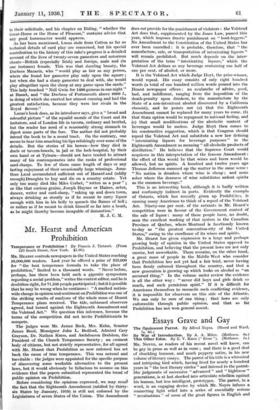Mr. Hearst and American Prohibition
Temperance or Prohibition ? By Francis J. Tietsort. (From 220 South Street, New York. 11.00).
Ma. HEARST controls newspapers in the United States reaching 10,000,000 readers. Last year he offered a prize of $25,000 for " the best temperance formula to take the place of prohibition," limited to a thousand words. " Never before, perhaps, has there been held such a gigantic symposium regarding a social problem," writes the contest editor, and he is doubtless right, for 71,248 people participated ; but it is possible that he may be wrong when he continues : "A marked nation- wide change in opinion and sentiment on Prohibition was one of the striking results of analyses of the whole mass of Hearst Temperance plans received. The tide, unbiassed observers agreed, had turned against the Eighteenth Amendment and the Volstead Act." We question this inference, because the terms of the competition did not invite Prohibitionists to compete.
The judges were Mr. James Beck, Mrs. Kahn, Senator James Reed, Monsignor John L. Bedford, Admiral Cary Grayson, Dr. Nathan Kress, and Archdeacon Dodshon, the President of the Church Temperance Society ; an eminent body of citizens, but not strictly representative, for all agreed with Mr. Hearst that Prohibition as now enforced has set back the cause of true temperance. This was natural and inevitable : the judges were appointed for the specific purpose of discovering some workable alternative to the present laws, but it would obviously be fallacious to assume on this evidence that the papers submitted represented the trend of public opinion on Prohibition..
Before considering the opinions expressed, .we may recall the fact that the Eighteenth Amendment (ratified by thirty- six States by January, 1919) is still not enforced by -the Legislatures of seven States of the Union. The Amendment does not provide for the punishment of violators : the Volstead Act does that, supplemented by the Jones Law, passed this year, which impbses drastic punishment on " boot-leggers." No Amendment to the Constitution of the United States has ever been cancelled : it is probable, therefore, that " the manufacture, sale, or transportation of intoxicating liquors " will remain prohibited. But much depends on the inter pretation of the term " intoxicating liquors," which the Volstead Act defines as any beverage containing one half of one per cent. of alcohol, or more.
It is the Volstead Act which Judge Hoyt, the prize-winner, would repeal. His essay consists of only eight hundred words (a total of one hundred million words poured into the Hearst newspaper offices : an avalanche of advice, good, bad, and indifferent, ranging from the imposition of the death-penalty upon drinkers, to the manufacture by the State of a non-intoxicant alcohol discovered by a California chemist), and he points out (a) that the Eighteenth Amendment cannot be replaced for many years to come, (b) that State option would be repugnant to national feeling, and (c) that small modifications of the alcoholic content of beverages would be useless. Judge Hoyt then comes to his constructive suggestion, which is that Congress should repeal the Volstead Act and substitute a new law defining " intoxicating liquors for beverage purposes " in the Eighteenth Amendment as meaning " all alcoholic products of distillation." He believes that the Supreme Court would acquiesce in this interpretation of the famous Amendment : the -effect of this would be that wines and beers would be allowed, but no spirits. A hundred and twelve years ago Thomas Jefferson summed up the matter in the same sense : " No nation is drunken where wine is cheap ; and none sober where the dearness of wine substitutes ardent spirits as the common beverage."
This is an interesting book, although it is badly written and confusingly indirect in parts. Evidently the example of Ontario, which has recently given up Prohibitiol, is causing many Americans to think of a repeal of the Volstead Act.- Ninety-one per cent. of the entrants in Mr. Hearst's competition were in favour of the Government control of the sale of liquor : many of these people have, no doubt, seen the excellent working of that system in the Canadian Province of Quebec, where Montreal is facetiously known to-day as " the greatest convention-city of the United States," owing to the excellence of its wines and spirits.
Mr. Hearst has given expression to 'a large and perhaps growing body of opinion in the United States opposed to Prohibition, and believing that the present laws are not only unwise, but unworkable. There remains, on the other hand, a great mass of people in the Middle West who consider that Prohibition has not yet had a fair trial, never having been firmly enforced throughout the country, and that a new generation is growing up which looks on alcohol as "an accursed thing." In the volume under review the evidence is all the other way : " never did boys and girls drink so much, and such pernicious spirit." If it is difficult for Americans themselves to reconcile such conflicting evidence, it is impossible for observers on this side of the Atlantic. We can only be sure of one thing ; that laws are only enforceable through public opinion, and that so far Prohibition has not won general assent.






































 Previous page
Previous page